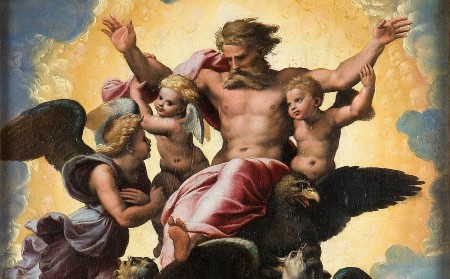We ask you, humbly: don't scroll away.
Hi readers, it seems you use Catholic Online a lot; that's great! It's a little awkward to ask, but we need your help. If you have already donated, we sincerely thank you. We're not salespeople, but we depend on donations averaging $14.76 and fewer than 1% of readers give. If you donate just $5.00, the price of your coffee, Catholic Online School could keep thriving. Thank you.Help Now >
THE SUNDAY HOMILY: Back to Basics - Living the Sabbath
FREE Catholic Classes
Highlights
Catholic Online (https://www.catholic.org)
11/4/2012 (1 decade ago)
Published in Year of Faith
Keywords: sunday homily, homily, homilies, catholic online, fr. james farfaglia, sabbath, work on sunday, mass, liturgy
CORPUS CHRISTI, TX (Catholic Online) - When I was growing up as a kid in Connecticut, Sunday was always lived as a very special day. Our parish was always at full capacity and every store was closed except for the newspaper store and the delicatessen, which both closed by Noon.
Something has changed.
It seems as if Sunday is just another day just like all of the other days of the week.
This Sunday's liturgy speaks to us about something which is fundamental for our lives as a Catholic people: "You shall love the Lord your God with all your heart, and with all your soul, and with your entire mind" (Matthew 22: 37).
One of the principle ways in which we live out these words of Jesus is through our celebration of the weekly Sabbath.
Let us recall the words of Sacred Scripture regarding the third of the Ten Commandments:
"Remember the sabbath day, to keep it holy. Six days you shall labor, and do all your work; but the seventh day is a sabbath to the Lord your God; in it you shall not do any work, you, or your son, or your daughter, your manservant, or your maidservant, or your cattle, or the sojourner who is within your gates; for in six days the Lord made heaven and earth, the sea, and all that is in them, and rested the seventh day; therefore the Lord blessed the sabbath day and hallowed it" (Exodus 20: 8-11).
During his pontificate, Blessed Pope John Paul II wrote an excellent document on how we must live each Sunday.
Regarding the Third Commandment he wrote, "In setting this commandment within the context of the basic structure of ethics, Israel and then the Church declare that they consider it not just a matter of community religious discipline but a defining and indelible expression of our relationship with God, announced and expounded by biblical revelation.
But, man's relationship with God also demands times of explicit prayer, in which the relationship becomes an intense dialogue, involving every dimension of the person. The Lord's Day is the day of this relationship par excellence when men and women raise their song to God and become the voice of all creation" (Dies Domini; 13, 15).
I am sure that we will all agree that the Sunday that we lived as children is something of the past. However, I believe that as a Catholic people, we need to recuperate the real meaning of Sunday as the Lord's Day and witness to all those around us the proper way to live out the weekly sabbath.
Secularism and materialism are trying to eradicate all sense of God and true religious practices from our modern society.
A very well known businessman told me that one day he gathered all of his employees together for a short meeting. Even though he is a Muslim, he attends Mass every Sunday with his Catholic wife. He knows that most of his employees are baptized Catholics. He expressed his concern about the morals of many of his employees and he urged them to go to Mass every Sunday and get things right with God.
During the meeting, he asked his employees if they knew what Easter is all about. One girl said, "That's the day the Jesus was born." Filled with amazement, he then said to the group, "Tell me then, what is Christmas all about?" Another girl said, "That's the day when we give presents to each other."
If people do not know what Christmas and Easter are all about, how will anyone even grasp the meaning of Sunday? For all Christian people, Sunday is the weekly celebration of Easter. "Sunday is a day which is at the very heart of the Christian life" (Dies Domini; 7).
How then are we to live the Sabbath, the Lord's Day? There are two fundamental aspects to the Sabbath.
First, we need to worship at our parish and secondly we must refrain from all unnecessary physical work.
Regarding the first practical aspect of the Sabbath, Sunday worship must be at the very center of our lives.
Pope Paul VI once said: "The Mass is the most perfect from of prayer." Saint Gregory the Great wrote that "the heavens open and multitudes of angels come to assist in the Holy Sacrifice of the Mass."
Saint John Vianney, the patron saint of parish priests said: "If we really understand the Mass, we would die of joy."
And the beloved Saint Padre Pio said that "it would be easier for the world to survive without the sun than to do without the Holy Mass."
We need to go to church every Sunday unless we are sick or the weather keeps us inside our homes. We need to dress appropriately for Mass, because the church is God's house. We need to worship at Mass with full and active participation.
Punctuality is a must.
The second aspect of our Sabbath is the prohibition from all unnecessary physical work. "Just as God rested on the seventh day from all his work which he had done, human life has a rhythm of work and rest. The institution of the Lord's Day helps everyone enjoy adequate rest and leisure to cultivate their familial, cultural, social, and religious lives.
On Sundays and other holy days of obligation, the faithful are to refrain from engaging in work or activities that hinder the worship owed to God, the joy proper to the Lord's Day, the performance of the works of mercy, and the appropriate relaxation of mind and body. Family needs or important social service can legitimately excuse from the obligation of Sunday rest. The faithful should see to it that legitimate excuses do not lead to habits prejudicial to religion, family life, and health" (Catechism of the Catholic Church; 2184, 2185).
This means that we are to do housework, yard work and shopping on other days, not on Sunday.
Although it is true that some people will have to work because they are involved with service orientated professions (hospitals and restaurants), employers of these types of professions have a moral obligation to provide their employees time for worship and adequate rest.
Aside from the problems that secularism and materialism have caused in our culture, the bottom line is the fact that most of us simply just do not know how to rest. We are a very active people and we need to recover the true sense of leisure.
Sunday rest is not simply baseball or football and a couple of six packs of beer, nor is the solution eight hours of spiritual reading. We need to recapture the real meaning of leisure.
Leonardo Da Vinci once said, "Every now and then go away, have a little relaxation, for when you come back to your work your judgment will be surer, since to remain constantly at work will cause you to lose power of judgment. Go some distance away because then the work appears smaller, and more of it can be taken in at a glance, and lack of harmony or proportion is more readily seen."
During my years in Spain and Mexico, it would be inevitable that interesting conversations with either Spaniards or Mexicans would take place regarding the differences between their countries and ours.
One man put it bluntly: "Look, the difference between us and you is that we work in order to live, and you live in order to work."
The root of America's extreme activity is a profound restlessness rooted in troubled consciences and lives that have lost the sense of what it means to be a creature of God.
This frantic pace of life is being put to sleep with sex, drugs, alcohol, excessive entertainment and frantic work schedules. Most people equate true leisure to laziness and irresponsibility.
In ancient Athens a man noticed the great storyteller Aesop playing childish games with some little boys. He laughed and jeered at Aesop, asking him why he wasted his time in such frivolous activity.
Aesop responded by picking up a bow, loosening its string, and placing it on the ground. Then he said to the critical Athenian, "Now, answer the riddle, if you can. Tell us what the unstrung bows imply."
The man looked at it for several moments but had no idea what point Aesop was trying to make. Aesop explained, "If you keep a bow always bent, it will break eventually; but if you let it go slack, it will be more fit for use when you want it."
Acknowledgements:
http://www.sermonillustrations.com
Father James Farfaglia is a contributing writer for Catholic Online and author of Get Serious! - A Survival Guide for Serious Catholics. You can visit him on the web at www.fatherjames.org and listen to the audio podcast of this Sunday homily.
---'Help Give every Student and Teacher FREE resources for a world-class Moral Catholic Education'
Copyright 2021 - Distributed by Catholic Online
Join the Movement
When you sign up below, you don't just join an email list - you're joining an entire movement for Free world class Catholic education.
-

-
Mysteries of the Rosary
-
St. Faustina Kowalska
-
Litany of the Blessed Virgin Mary
-
Saint of the Day for Wednesday, Oct 4th, 2023
-
Popular Saints
-
St. Francis of Assisi
-
Bible
-
Female / Women Saints
-
7 Morning Prayers you need to get your day started with God
-
Litany of the Blessed Virgin Mary
Daily Catholic
 Daily Readings for Thursday, October 31, 2024
Daily Readings for Thursday, October 31, 2024 St. Wolfgang: Saint of the Day for Thursday, October 31, 2024
St. Wolfgang: Saint of the Day for Thursday, October 31, 2024 Memorare: Prayer of the Day for Thursday, October 31, 2024
Memorare: Prayer of the Day for Thursday, October 31, 2024- Daily Readings for Wednesday, October 30, 2024
- St. Alphonsus Rodriguez: Saint of the Day for Wednesday, October 30, 2024
- Prayer to the Holy Spirit # 2: Prayer of the Day for Wednesday, October 30, 2024
![]()
Copyright 2024 Catholic Online. All materials contained on this site, whether written, audible or visual are the exclusive property of Catholic Online and are protected under U.S. and International copyright laws, © Copyright 2024 Catholic Online. Any unauthorized use, without prior written consent of Catholic Online is strictly forbidden and prohibited.
Catholic Online is a Project of Your Catholic Voice Foundation, a Not-for-Profit Corporation. Your Catholic Voice Foundation has been granted a recognition of tax exemption under Section 501(c)(3) of the Internal Revenue Code. Federal Tax Identification Number: 81-0596847. Your gift is tax-deductible as allowed by law.









 Daily Readings for Thursday, October 31, 2024
Daily Readings for Thursday, October 31, 2024 St. Wolfgang: Saint of the Day for Thursday, October 31, 2024
St. Wolfgang: Saint of the Day for Thursday, October 31, 2024 Memorare: Prayer of the Day for Thursday, October 31, 2024
Memorare: Prayer of the Day for Thursday, October 31, 2024

